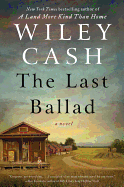
Based on actual events, Wiley Cash's third novel, The Last Ballad, relates the story of Ella May Wiggins and the early fight for unions in the North Carolina Appalachian region. Cash, as in his previous novels, deftly employs multiple voices to recount a story about the violent struggle for workers' rights and the tragedy of Wiggins's murder.
Mother of four with a fifth on the way, Wiggins works nights in a textile mill to support her family. Earning $9 a week, the white woman labors and lives alongside African Americans in abject poverty. Abandoned by her husband, Wiggins can't stay home to care for her sick child without the threat of losing her job. So when she learns of a union rally, she risks attending and dares to hope for a better life. Wiggins's story and her singing talent quickly turn her into the movement's poster child. The mill owners, however, have no intention of allowing the "bloody red flag of Communism" to fly over their businesses; they will stop the union efforts whatever the cost.
Cash (A Land More Kind than Home; This Dark Road to Mercy) juxtaposes the beauty of Wiggins's love and devotion--to her family and to her black friends and neighbors--against the hideousness of racism, classism and hate in 1929 North Carolina. These contradictions illuminate the novel's intense sense of place as much as the compelling physical details. Told with grace and compassion, The Last Ballad is an enthralling narrative and a powerful reminder of the immense sacrifices made for workers in the United States. --Jen Forbus, freelancer

